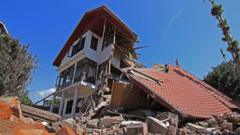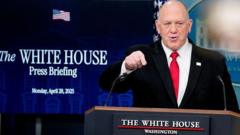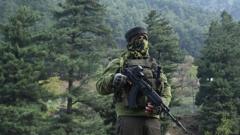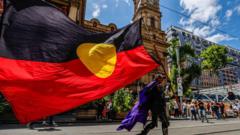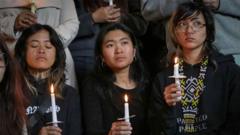A deadly car attack at a Christmas market in Magdeburg has left the community in mourning while amplifying tensions regarding security and immigration, as the far-right AfD party seeks to capitalize on the tragedy despite the suspect's ambiguous motives.
Magdeburg Attack Fuels Rising Tensions and Far-Right Sentiment
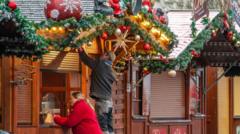
Magdeburg Attack Fuels Rising Tensions and Far-Right Sentiment
The tragic Christmas market attack in Magdeburg provokes outrage and fear, sparking a political firestorm ahead of upcoming elections.
Article Text:
In the heart of Magdeburg, a somber atmosphere hangs over the Christmas market where a devastating attack took place, claiming five lives and injuring over two hundred. Amongst the bustling stalls, 50-year-old Eidwicht reflects on the chaos, sharing her emotional turmoil as she anxiously awaited a response from her granddaughter, who was near the scene. “I still feel bad; I can’t shake it off,” she lamented.
The suspect in this tragic incident, identified as Saudi refugee Taleb Al-Abdulmohsen, has garnered attention not only for his alleged crime but also for his connections to far-right ideology. Authorities labeled him an "untypical" attacker, with previous attacks on Christmas markets mainly attributed to extreme Islamist groups. Al-Abdulmohsen's expressed criticism of Islam and support for the far-right Alternative for Germany (AfD) party has raised eyebrows as the party distances itself from his statements.
In a show of solidarity, the AfD plans a procession in Magdeburg, attended by national party leader Alice Weidel, who has seized this moment to amplify security and immigration concerns. Speaking post-attack, Weidel harshly criticized government policies around immigration, asserting that "Magdeburg would not have been possible without uncontrolled immigration."
Countering this narrative, anti-racism groups in Magdeburg have accused the AfD of exploiting the incident for political gain. Activist David Begrich called for societal solidarity amidst fears of scapegoating the migrant community. “There is great concern among migrants of being targeted,” he noted, emphasizing the need for cooperation across communities.
Locals are questioning how this assault could occur despite heightened security measures at Christmas markets and prior investigations into the suspect's background. Critics have pointed out flaws in security protocols that allowed the attacker access. The outpouring of anger towards the government and security forces indicates a broader unrest regarding public safety.
As businesses reopen at the market to reclaim some semblance of normalcy, stallholders are reluctant to engage with media, their grief palpable. Relations between the press and the public have soured, particularly in light of a recent protest involving 2,000 far-right demonstrators in the city.
The aftermath of the Magdeburg attack is a painful reminder of the fragility of social cohesion within a nation grappling with complex issues of security, immigration, and rising extremism in a charged political landscape.
In the heart of Magdeburg, a somber atmosphere hangs over the Christmas market where a devastating attack took place, claiming five lives and injuring over two hundred. Amongst the bustling stalls, 50-year-old Eidwicht reflects on the chaos, sharing her emotional turmoil as she anxiously awaited a response from her granddaughter, who was near the scene. “I still feel bad; I can’t shake it off,” she lamented.
The suspect in this tragic incident, identified as Saudi refugee Taleb Al-Abdulmohsen, has garnered attention not only for his alleged crime but also for his connections to far-right ideology. Authorities labeled him an "untypical" attacker, with previous attacks on Christmas markets mainly attributed to extreme Islamist groups. Al-Abdulmohsen's expressed criticism of Islam and support for the far-right Alternative for Germany (AfD) party has raised eyebrows as the party distances itself from his statements.
In a show of solidarity, the AfD plans a procession in Magdeburg, attended by national party leader Alice Weidel, who has seized this moment to amplify security and immigration concerns. Speaking post-attack, Weidel harshly criticized government policies around immigration, asserting that "Magdeburg would not have been possible without uncontrolled immigration."
Countering this narrative, anti-racism groups in Magdeburg have accused the AfD of exploiting the incident for political gain. Activist David Begrich called for societal solidarity amidst fears of scapegoating the migrant community. “There is great concern among migrants of being targeted,” he noted, emphasizing the need for cooperation across communities.
Locals are questioning how this assault could occur despite heightened security measures at Christmas markets and prior investigations into the suspect's background. Critics have pointed out flaws in security protocols that allowed the attacker access. The outpouring of anger towards the government and security forces indicates a broader unrest regarding public safety.
As businesses reopen at the market to reclaim some semblance of normalcy, stallholders are reluctant to engage with media, their grief palpable. Relations between the press and the public have soured, particularly in light of a recent protest involving 2,000 far-right demonstrators in the city.
The aftermath of the Magdeburg attack is a painful reminder of the fragility of social cohesion within a nation grappling with complex issues of security, immigration, and rising extremism in a charged political landscape.




